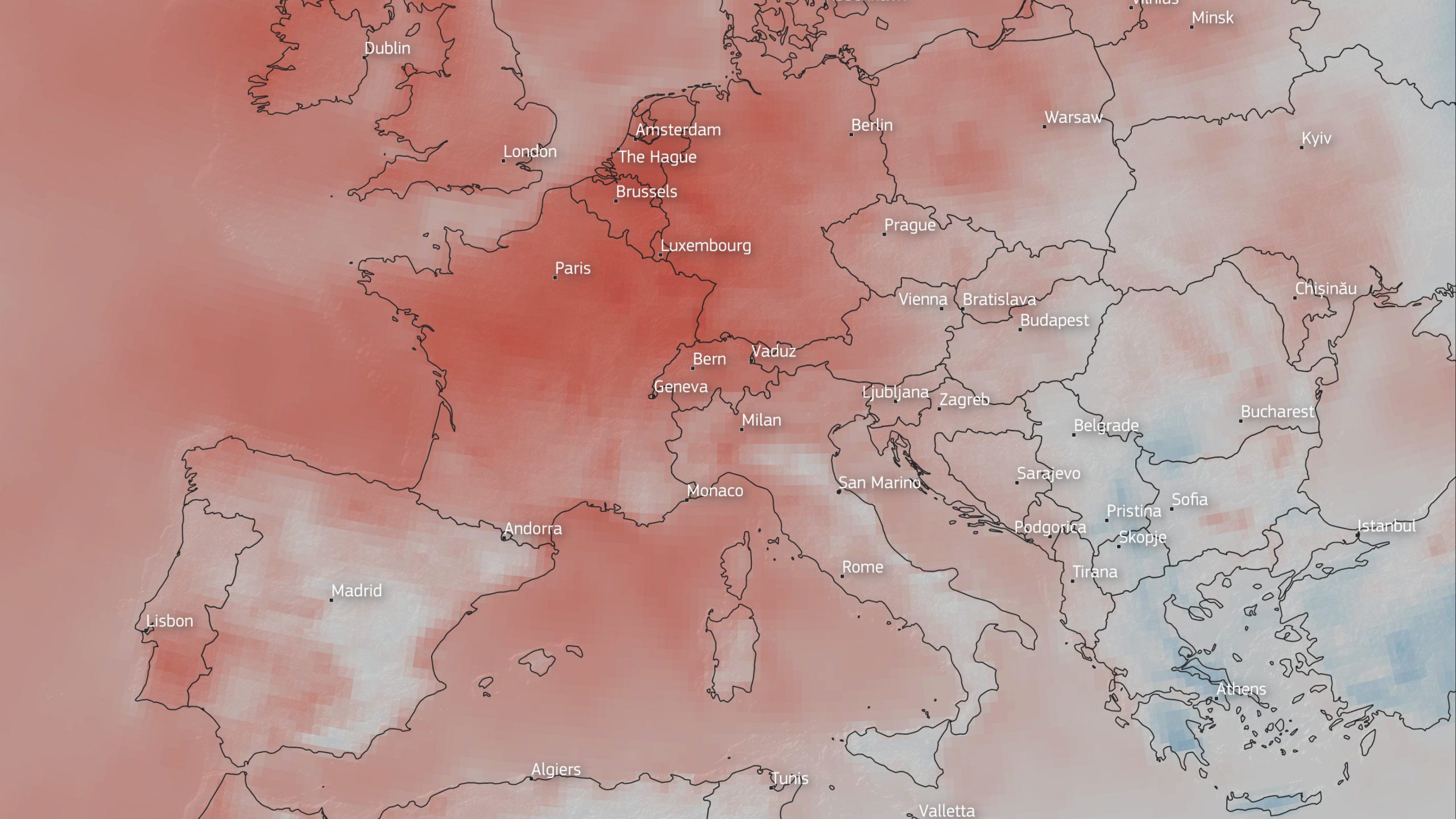The Dasgupta family hold a large gathering in Barisal every year. Beautiful rivers, rice plantations, and lush nature colour the landscape of this south-central Bangladesh district. The economy of the region, which sits just one meter above sea level, relies on agriculture.
Barisal is one of the planet’s many regions currently affected by climate change and research suggests that this will worsen in the future. Rice production and agriculture are already suffering from heavy monsoon floods. Rainfall patterns and cyclones are changing, affecting the livelihoods of people. Extreme heat events are already having significant impacts on the labour force along with the general population. The beautiful rivers that epitomize the area will be strongly impacted by sea-level rise.
As a child, Shouro Dasgupta visited his family home in Barisal every year, the very place where his parents grew up. He would spend a lot of time in his father’s ancestral home. Year after year, he observed how the landscape was changing and listened to the stories of his family’s connections in the area. This was an annual ritual for Shouro before moving to the US to pursue his studies. A journey that eventually led him to Venice, where he is now continuing his research and teaching on climate change economics at the CMCC Foundation – Euro-Mediterranean Center on Climate Change, Ca’ Foscari University of Venice, and RFF-CMCC European Institute on Economics and the Environment (EIEE).
As one of the 120 health and climate change academics and clinicians behind the recently released 2020 report of The Lancet Countdown on health and climate change, he knows how vulnerable Bangladesh is to the impacts of climate change. He is aware of how people’s health and wellbeing will be affected in the future, and not only in his home country. Indeed, no country – whether rich or poor – is immune to the health impacts of climate change: this is one of the key messages contained within the report’s fifth edition.
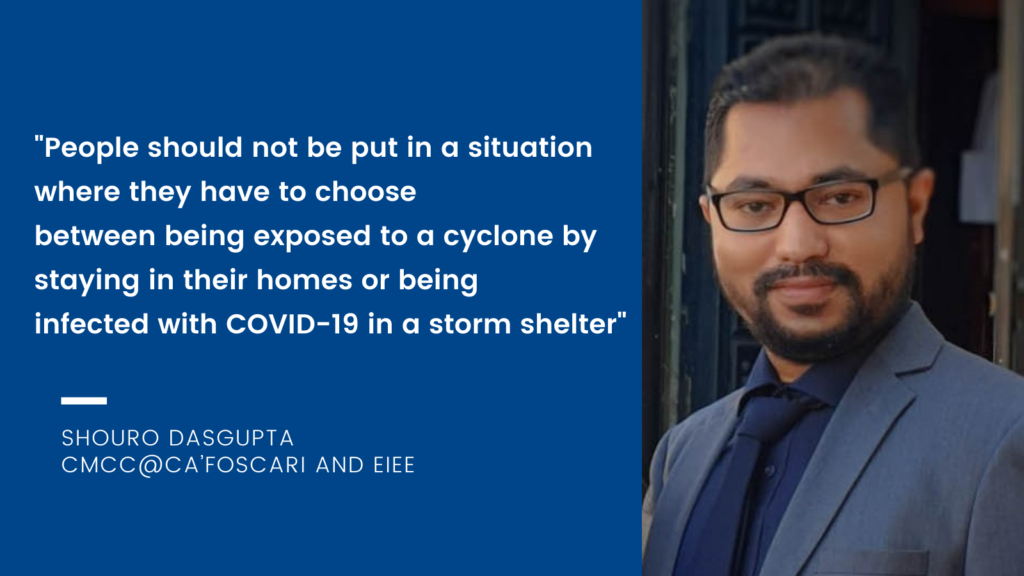
The Lancet Countdown 2020 is edited by The Lancet, the world leading journal on medical science, and is the fruit of a collaboration between experts from 38 institutions including the World Health Organisation, World Meteorological Organisation, and led by University College London.
The report highlights that the current pandemic and climate change represent converging crises and calls for urgent action to align global recovery from COVID-19 with our response to climate change. “Today, we are facing an acute and chronic environmental health emergency. Acute is COVID-19, which is emerging because human begins have created the conditions for a rising risk of zoonosis and chronic because of the changing climate” affirmed Richard Horton, Editor-in-Chief of The Lancet. Unless urgent action is taken, the report warns, the health impacts of climate change will bring further disruption, threaten lives and livelihoods and compromise the hospitals and clinics we depend on.
Linking climate change to the COVID-19 pandemic
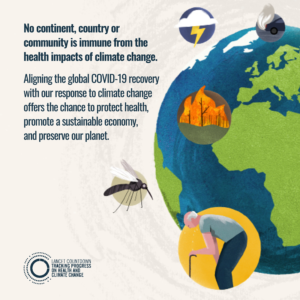 “We do not have the luxury of taking one crisis at a time,” observes Dr. Dasgupta. “We have multiple crises, and we need to tackle all of them. The health impacts of climate change are compounding the impacts of the pandemic. Wildfires and other extreme weather events such as droughts or heavy rainfall events have also affected communities at the same time as the pandemic. Bangladesh had to evacuate millions of people to shelters, in the middle of the pandemic, to safeguard people from a cyclone.”
“We do not have the luxury of taking one crisis at a time,” observes Dr. Dasgupta. “We have multiple crises, and we need to tackle all of them. The health impacts of climate change are compounding the impacts of the pandemic. Wildfires and other extreme weather events such as droughts or heavy rainfall events have also affected communities at the same time as the pandemic. Bangladesh had to evacuate millions of people to shelters, in the middle of the pandemic, to safeguard people from a cyclone.”
In May 2020, more than two million people in Bangladesh and more than four million people in India were evacuated to shelters for the season’s first tropical cyclone, Amphan. “This was an example of how the world must deal with multiple crises at the same time: a pandemic, which is highly contagious in nature, and a cyclone which requires people to evacuate to shelters. During such events, social distancing should still be maintained, masks should still be worn, places should be sanitized. People should not be put in a situation where they have to choose between being exposed to a cyclone by staying in their homes or being infected with COVID-19 in a storm shelter.”
Lowest common denominator: inequalities
Both climate change and the pandemic exacerbate existing inequalities within and between countries. There is evidence in the literature that climate change is worsening income and gender inequalities, among other issues. And the pandemic is doing the same. The most vulnerable segments in our societies are being affected more by both crises.
“Climate change has already become an issue of justice and equity” explains Dr. Dasgupta. “If we talk about impacts such as climate-induced migration and displacement, it is generally the poorest people in a country who live on the coastal lines those who will be hit the most by sea-level rise. In terms of labor productivity, the greatest impacts are on sectors such as agriculture and construction, where relatively low-income workers work: they’re more vulnerable by nature of their work, and they are also more exposed to the weather events.”
Looking at the unequal impacts across countries, Bangladesh is considered a poster child of climate change impacts. Almost 30 million people (out of a population of 165 million) are highly vulnerable to extremes of heat, and there has been a 150% increase in the number of heat-related deaths in the country from a 2000-2004 baseline. Under a scenario of one-meter global sea-level rise, almost 17 million people in Bangladesh will be exposed to risks.
Dual-action, triple win
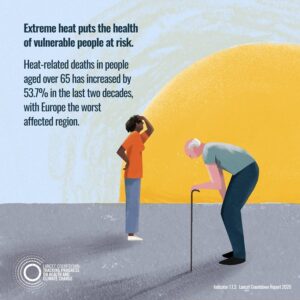 The pandemic has shown the unpreparedness of our health systems to deal with so much exposure and vulnerability at one time. Moreover, as a Lancet editorial published alongside the new report reveals, climate change and zoonotic pandemic risk share common drivers, making them inextricably entwined.
The pandemic has shown the unpreparedness of our health systems to deal with so much exposure and vulnerability at one time. Moreover, as a Lancet editorial published alongside the new report reveals, climate change and zoonotic pandemic risk share common drivers, making them inextricably entwined.
“The pandemic showed us that no matter how rich a country is, as the number of patients increases in a short period of time, systems cannot deal with them,” explains Dasgupta. “Let’s think in the context of climate change, especially extreme heat events. We will see more and more people needing health services because of heat strokes, respiratory issues or cardiovascular issues in the future, and most health systems across the world will find it difficult to deal with them. As we have seen from the pandemic, when the number of people requiring urgent critical care grows, many of the planned health interventions have to be postponed. For example, we know that millions have had to postpone their chemotherapy or other required surgeries. Consequently, with unprepared health systems, health issues become prolonged for many people. The actions we take now against climate change will protect our health now, but they will also have long-term benefits because they will result in cleaner air, healthier diets, and liveable cities for all of us.”
Responding jointly to these converging crises will deliver a triple win for the planet, the authors highlight: improve public health, create a sustainable economy, and protect the environment. But time is short, and the window of opportunity is now. The next five years will be crucial to meet the Paris Agreement’s targets, and they coincide with the global COVID-19 recovery. Only concerted action will avoid further damaging public health in the short term and long term.
The growing response of health professionals
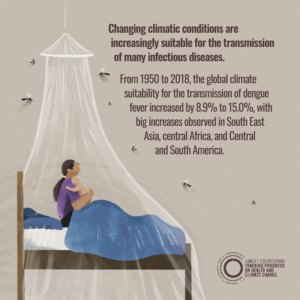 “It’s not all bad news” observes Dasgupta. “This year, more than ever, we placed more trust in the health sector, everywhere. Our trust in doctors, nurses and in the healthcare sector in general, has never been higher. And we are seeing more and more health care professionals becoming engaged in climate change issues globally.” Indicators presented in the 2020 report of the Lancet Countdown detect a growing momentum of the health profession’s engagement with climate change: health services in 86 countries are now connected with their equivalent metrological services to assist in health adaptation planning. And at least 51 countries have developed plans for national health adaptation. “Building on this,” continues Dasgupta, “we are seeing more people than ever making the links between health and climate change. From 2018 to 2019, the coverage of health and climate change in the media increased by 96% worldwide. This is far greater than the increased coverage of climate change overall and has reached the highest observed point to date. So, even the media is covering these issues more and more, which means more and more people are being made aware of the critical issue of climate change impacts on human health. Hopefully, we’ll see an increasing number of people take individual actions, talk to their lawmakers, and ask for changes in policies.”
“It’s not all bad news” observes Dasgupta. “This year, more than ever, we placed more trust in the health sector, everywhere. Our trust in doctors, nurses and in the healthcare sector in general, has never been higher. And we are seeing more and more health care professionals becoming engaged in climate change issues globally.” Indicators presented in the 2020 report of the Lancet Countdown detect a growing momentum of the health profession’s engagement with climate change: health services in 86 countries are now connected with their equivalent metrological services to assist in health adaptation planning. And at least 51 countries have developed plans for national health adaptation. “Building on this,” continues Dasgupta, “we are seeing more people than ever making the links between health and climate change. From 2018 to 2019, the coverage of health and climate change in the media increased by 96% worldwide. This is far greater than the increased coverage of climate change overall and has reached the highest observed point to date. So, even the media is covering these issues more and more, which means more and more people are being made aware of the critical issue of climate change impacts on human health. Hopefully, we’ll see an increasing number of people take individual actions, talk to their lawmakers, and ask for changes in policies.”
Click here to watch the Bangladeshi Launch of the 2020 Report of the Lancet Countdown.





